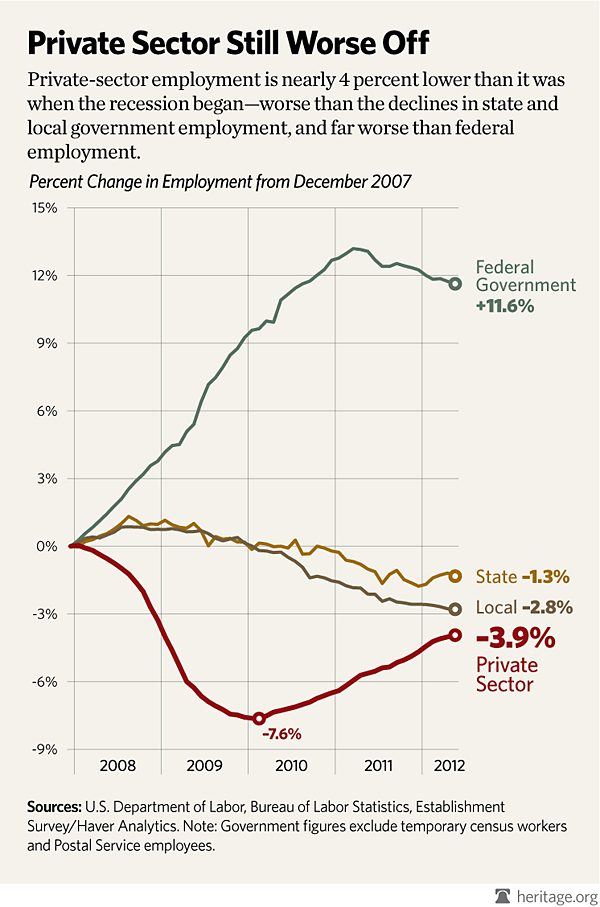Morning Bell: The Private Sector is Not “Doing Fine”
Amy Payne /
In now-infamous comments on Friday, President Barack Obama informed America that “the private sector is doing fine.” This, of course, was news to the 12.7 million people who are out of work and the millions more who are struggling with the part-time jobs they can find, or have simply given up looking.
While the President’s comment is astoundingly out of touch with the public—and economic reality—perhaps even more distressing is that this wasn’t a passing verbal gaffe. This is actually a consistent talking point of the President and Democratic leadership that goes largely unchallenged by the media.
Senate Majority Leader Harry Reid (D–NV) made the same case last fall when he was pushing a $35 billion bailout for state and local governments. “It’s very clear that private-sector jobs have been doing just fine,” Reid argued. “It’s the public-sector jobs where we’ve lost huge numbers, and that’s what this legislation is all about.”
This is the President’s and the Majority Leader’s solution to the jobs crisis: more so-called stimulus and more government employees.
As Heritage’s James Sherk has explained, this thinking is completely backwards: “If the recession has barely touched one sector of the economy, it is government.”
If anyone is “doing fine,” it’s government employees. This goes beyond the far more generous pension and health benefits they enjoy. While the private sector lost 4.6 million jobs (a 3.9 percent drop) since the recession began, government payrolls have only fallen by 240,000 jobs (a 1.1 percent drop). Federal employment has actually grown nearly 12 percent since the end of 2007, and while the country suffers from 8.2 percent unemployment, the unemployment rate for government employees is just 4.2 percent.
In any case, the federal government borrowing more money to transfer to state and local governments is not a job-creation policy, and it is outside the scope of the federal government. It’s merely a ploy to please union bosses, who are always eager to draw more federal dollars.
This government-boosting strategy also ignores the fact that it has been tried before and found wanting. President Obama’s first trillion-dollar stimulus plan was a failure (and a waste). And Europe is in the shape it is because of years of government largesse. Ironically President Obama sought to focus the media’s attention on Europe on Friday in an attempt to divert it from his own economic mismanagement.
We cannot avoid a European-style fiscal crisis by emulating Europe’s philosophy of government-centered economies and overspending.
But the President doesn’t understand the function of the private sector—creating and producing—so he is compelled to separate it from the rest of his reality. The private sector is indeed a bit of an alien place to this president , according to his accounting. He wrote in his autobiography Dreams from My Father about finding “conventional work” to pay the bills until he could land his dream job of community organizer. He was determined to remain in the private sector only briefly: “Like a spy behind enemy lines, I arrived every day at my mid-Manhattan office and sat at my computer terminal.”
Following a flurry of outrage over his Friday comment, the President backtracked, saying what he meant was that “we’ve actually seen some good momentum in the private sector. That has not been the biggest drag on the economy.”
Moving from 8.1 percent unemployment to 8.2 percent can only be considered “good momentum” in this White House. However, he’s correct about one thing: The biggest drag on the economy isn’t the private sector, but Washington.
Job creators in the private sector are paralyzed, suffering from overregulation and waiting for Taxmageddon to hit in January. The longer Congress waits to prevent Taxmageddon, the more uncertainty there will be for businesses.
Of course, if the President’s goal is to add more government employees, then he wouldn’t be as worried about the impact of these taxes and regulations on the private sector, which is “doing fine.”
In Dreams from My Father, Obama excused his temporary need to make money from a private-sector job while seeking his destiny as a community organizer: “I would need the money later, I told myself. Organizers didn’t make any money; their poverty was proof of their integrity.”
If poverty is proof of integrity, then the President seems determined to make saints of us all.
Quick Hits:
- U.S. Secretary of Commerce John Bryson was cited for felony hit-and-run and found unconscious in his vehicle over the weekend in San Gabriel Valley, California.
- Spain is getting a loan: up to 100 billion euros from its eurozone colleagues. This makes it “the fourth country to seek assistance since Europe’s debt crisis began,” according to Reuters.
- “The independence and speed of two veteran prosecutors named by the Justice Department to investigate leaks of national security information could determine whether the controversy settles quickly or blossoms into an election-year problem for President Barack Obama,” reports The Washington Post.
- After the State Department announced rewards for information leading to the capture of members of al-Qaeda affiliate al-Shabaab, the terrorist group countered with an offer of camels to those who would lead them to President Obama and chickens for information about Secretary of State Hillary Clinton.
- HHS recently held a health care town hall to educate women about Obamacare. The effects of decreased choice, higher premiums, and violations of religious freedom were among the Top 5 Things the Administration Forgot to Tell Women.

